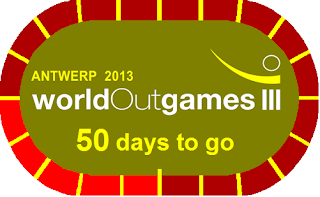With only 50 days to go before the opening ceremony of this year’s World Outgames, here’s a look back at the sport and cultural festival of the previous games held in Copenhagen
There was a more varied international content to the cultural festival than at previous games. This variety was reflected in it’s title – OutCities – a plural title indicating Copenhagen Melbourne Rio , Antwerp , Mexico Arhus
There were more sports at the Copenhagen Copenhagen
One of the challenges encountered by many lgbt athletes when attending events such at the Outgames, Gay Games or EuroGames is often the absence of a playing partner or team to play with in some events. Badminton players, for example, would arrive from the other side of the world and not know who his/her doubles team-mate would be, if any. Quite often the draw to pair up players didn’t take place until the morning of the competition. It is not unknown for two players who had never met until a couple of hours before their first match as a team to go on to win a medal. This has often led to some very creative team names. One water polo team at Copenhagen Atlanta , New York
Officially there were 6,500 athletes, 89% of whom identified themselves as members of the lgbt community. According to Tommy Kristoffersen, Outgames Sports Co-ordinator, there were 13 transgender athletes, the largest number recorded at an international multi-sport festival.
International sporting governing bodies have yet to agree on the criteria for inclusion of transgender athletes. The Outgames had generally followed the Olympic policy which set strict regulations on which gender-based contest (male or female) the athlete could compete, according to the transition stage of the specific trans athlete – if they were allowed to compete at all.
At the Copenhagen Outgames a Canadian trans athlete, Jennifer McCreath, competed in the marathon and swimming contests. She had to compete in the female competition, even though she had not fully transitioned. The timing equipment used for international sport only records male or female results – there is no third setting. Jennifer’s finishing times in both the marathon and swimming were, accordingly, recorded as female results.
After some discussion with the organisers Jennifer suggested the Outgames adopt a third gender category. They agreed, and an interim policy was adopted on-site with an official published policy statement coming a few months later.
As the only transgender athlete in both of her events Jennifer was recognised as the gold medal winner. However, for the time being at least, the International Gay and Lesbian Aquatics Association (IGLA), who were using the Outgames as their world championship meet, awarded her the silver medal as second-place finisher in her women’s category. The IGLA had no third gender category.
There were many sporting achievements throughout the Outgames, too many to list, but here is a small selection.
Confusion and controversy reigned at the men’s volleyball contest. The organisers decided to re-organise the categories for the final medal round. The teams quickly objects, complained, and presented a petition.
As expected, Canada
AIDS campaigner and US
One of several all-straight teams won a silver medal. Team SAS, a Danish female handball team, were beaten in the final by fellow Danes Team Panic.
As mentioned last time, 58-year-old American runner Dean Koga won a gold medal in his gage group in the 200 meters the day after being injured in a bomb attack at the track.
The oldest known competitor was 86-year-old Robert Lornezen in the bridge tournament.
The nation with the most medals was the USA Germany Netherlands Denmark


No comments:
Post a Comment